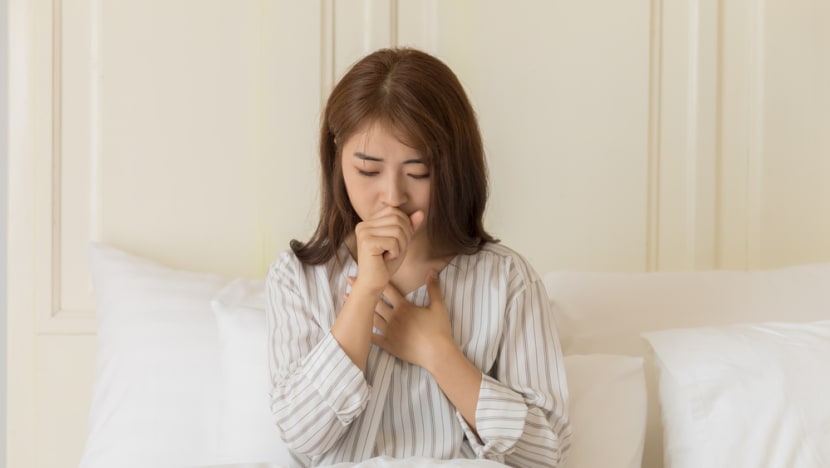Clearing the air about coughing
Uncover key insights on the causes of coughs, the various cough types, and the methods to relieve those persistent symptoms.

Identifying the cause and type of your cough can help you target it more effectively with the right over-the-counter medication. Photos: Shutterstock
You know the drill: The sniffles come first, followed by congestion and an annoying tickle in your chest. Before you know it, you’ve developed a full-blown cough.
Why does it happen, and what can you do to remedy it?
According to Ms Sue Low, regional medical affairs manager at iNova Pharmaceuticals, it is normal to cough once in a while. “Coughing is the body’s natural defence mechanism to expel irritants – such as mucus, smoke and allergens like dust, mould and pollen – that get trapped in our airways,” she explained.
That said, if you wish to alleviate a lingering cough, identifying the type of cough you are dealing with can help you target it more effectively.
DRY VERSUS CHESTY COUGH
Coughs can be broadly classified into two types: A dry cough and a chesty, or wet, cough, said Ms Low. “A dry, hacking cough does not produce much phlegm, while a chesty cough tends to produce a ‘rattling’ sound when you cough or even when you breathe due to the thickened phlegm in the throat and airways.”
Often, a dry cough is caused by an infection due to cold and flu viruses. It can also be triggered by environmental factors such as pollutants, cigarette smoke or a change in temperature. A chesty cough, on the other hand, can be caused by a bacterial infection, chronic irritation of the lungs due to smoking, or other medical conditions such as bronchitis or asthma.
Knowing the difference between the two can help you choose the right over-the-counter medication.
HERBAL INGREDIENTS IN MANAGING COUGHS

While most cough syrups prescribed by doctors contain non-herbal ingredients, it is worth noting that numerous traditional herbal ingredients have also been studied for their efficacy in combating coughs, said Ms Low.
Marshmallow root, for instance, is a type of herb known for having cough-relieving properties. “The gummy, sap-like substance called mucilage found in marshmallow root works to form a protective layer over the mucous membrane of the throat to soothe irritation,” she said.
Marshmallow root is the key ingredient in the mint-flavoured Duro-Tuss Herbal Dry Cough Liquid, which helps to reduce one’s urge to cough.
For treatment of chesty coughs, Ms Low recommends the cherry-flavoured Duro-Tuss Herbal Chesty Cough Liquid. She said: “The cough liquid contains ivy leaf extract, a natural ingredient with saponin compounds that act as an expectorant to loosen up mucus, making it easier to expel it from your airways. Over time, this helps clear chest congestion.”
The Duro-Tuss Herbal Dry Cough Liquid is suitable for adults and children above the age of three, while the Duro-Tuss Herbal Chesty Cough Liquid is suitable for adults and children above the age of two. Both are non-drowsy formulations, so you can take them during the day without having to worry about affecting your regular routine.
PREVENTION IS BETTER THAN CURE

To mitigate the risk of a developing cough turning into a full-blown condition, it is advisable to adopt preventive measures. These include getting adequate rest, staying hydrated and taking a hot shower to help loosen up mucus.
If you sleep in an air-conditioned room at night, Ms Low suggests using a humidifier to prevent dryness and keep your airways comfortable.
She explained: “Studies have shown that a cold, dry environment can worsen respiratory illnesses. If you’re suffering from a chesty cough, you may notice an increase in phlegm after sleeping in an air-conditioned room. That is because during sleep, phlegm and irritants tend to accumulate in the lungs and throat. Upon waking up, the phlegm begins to break up, triggering temporary bouts of coughing.”
A cough typically clears up within a few weeks. If your symptoms last longer than 10 days or if you are experiencing chest pains, fever, vomiting, have developed thick, yellowish-green phlegm or are coughing up blood, Ms Low recommends seeking medical advice from your doctor immediately.
Keep your cough in check with Duro-Tuss Herbal Cough Liquids, available at pharmacies and major supermarkets islandwide from S$10.90.
The article should not be taken as medical advice or used as a recommendation for any specific treatment or medication. Always read the product label and follow the directions for use. If symptoms persist, please consult your healthcare professionals.
















